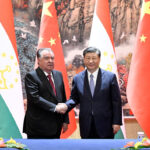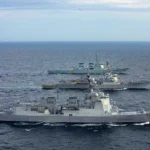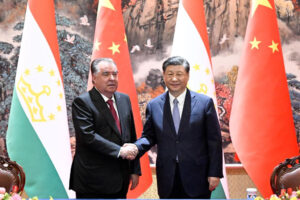The British “Guardian” website recently reported that in early February, US Secretary of Defense Lloyd Austin said that the US and Australia had made “significant progress” in allowing Australia to have a fleet of nuclear-powered submarines as soon as possible.
According to previous reports by foreign media, British Prime Minister Sunak and Australian Prime Minister Albanese will go to Washington, USA in mid-March, and together with US President Biden, they will announce the plan of the UK and the US to help Australia build nuclear-powered submarines.
The United States, Britain, and Australia are determined to promote nuclear submarine cooperation, which has aroused more and more concerns from the international community.
The United States is unable to build submarines
British media reported that in early February, U.S. Defense Secretary Lloyd Austin and Australian Defense Minister Marrs met in Washington, D.C., and discussed topics such as the U.S.-UK-Australia “Ocus” agreement and regional security. Austin claimed that the United States and Australia have made significant progress in formulating the best path for Australia to obtain “conventional armed nuclear-powered submarine capabilities” as soon as possible. Mars also posted on social media that it was an “excellent meeting.”
Previously, the US and Australian media reported that British Prime Minister Sunak and Australian Prime Minister Albanese are expected to visit the US in mid-March. The Australian Broadcasting Corporation stated that the three countries will then announce the replacement of the Australian Navy’s aging “Collins”-class conventionally powered submarines through the “Ocus” agreement, and finalize the “best way to cooperate” in obtaining new nuclear-powered submarines.
According to Bloomberg, the United States, Britain and Australia are sharing classified military capabilities, allowing Australia to build and deploy new nuclear-powered submarines in the Pacific. This project is part of the “Ocus” agreement initiated and signed by the three countries in 2021, which aims to “counterbalance China’s military growth in the Pacific region.”
According to the “Ocus” agreement signed by the United States, Britain and Australia in September 2021, Australia will become the second ally after the United Kingdom to acquire the United States’ nuclear-powered submarine technology. However, over the past year, the progress of cooperation has not been as smooth as expected by the three countries. The British “Guardian” stated that people are increasingly worried that the United States may find it difficult to provide Australia with nuclear-powered submarines.
According to the German “Frankfurter Allgemeine Zeitung”, in December last year, U.S. Democratic Senator Jack Reid and Republican Senator James Inhofe expressed concern about the delivery of nuclear-powered submarines to Australia by the United States in a letter to Biden. They pointed out that the deal under the framework of the “Orcus” agreement may overburden the US submarine industry.
“Currently, the United States is facing two obstacles in helping Australia build a nuclear-powered submarine fleet: First, the domestic laws of the United States have strict restrictions on the export of technology, especially nuclear technology. If the Biden administration wants to provide Australia with nuclear-powered submarine technology, it must It will take a long process in the U.S. Congress to amend the relevant laws; second, the U.S. has limited nuclear-powered submarine production capacity and cannot even meet its own needs. If it forcibly helps Australia ‘take orders’, it may affect the construction of the U.S. naval power.” Wei Zongyou, a professor at the Center for American Studies at Fudan University, said in an interview with our reporter.
It is reported that Jack Reed and James Inhofe pointed out in their letter to Biden that the United States currently has more than 50 nuclear submarines, but the US Navy needs 66. A person in the US military once said frankly that the relevant US factories are working hard to build their own “Virginia” class nuclear submarines, and they are too busy to take care of themselves, and they have no intention of providing nuclear-powered submarines to Australia in the short term.
Australia loses money and makes money
Although the “Ocus” agreement is plagued by problems and has been criticized by the international community, the United States, Britain, and Australia are still determined to promote nuclear-powered submarine cooperation.
Mars recently stated that the announcement of the nuclear submarine cooperation program under the framework of the “Ocus” agreement is now “very close”, which will be a “true trilateral” solution involving the United Kingdom and the United States. Provide Australia with a nuclear powered submarine capability”.
Wei Zongyou analyzed that the three countries of the United States, Britain and Australia have their own plans: “Since the Biden administration came to power, it has continued the previous administration’s strategic positioning of China as the ‘number one strategic competitor’, and believes that it is necessary to make all-round preparations, from economics, technology, The military and other fields contain China. Specifically in the military field, the United States has pieced together an “Indo-Pacific version of NATO” in Asia in recent years, hoping that its Asia-Pacific allies can shoulder more responsibilities. The essence of the “Ocus” agreement is exactly this. The United States uses nuclear power Under the guise of cooperation in submarine technology, the actual purpose is to build Australia into a frontier against China. Britain hopes to use the “Ocus” agreement to further seek its status as a “global Britain” after “Brexit” on the one hand, and on the other On the one hand, it has increased its sense of presence in the Asia-Pacific region. In recent years, Australia has regarded China as a security threat and South Pacific island countries as its own ‘backyard’, so it believes that it is necessary to strengthen its underwater military capabilities.”
In fact, since the establishment of the “Ocus” agreement, it has been generally regarded as a tool to serve the strategic interests of the United States. Especially for Australia, it is actually just tied more tightly to the chariot of the United States and further reduced to a pawn of the United States in the Asia-Pacific region.
“Australia is surrounded by the sea and has natural barriers. Judging from its strategic environment and security requirements, it does not need nuclear-powered submarines at all. Australia’s participation in the ‘Ocus’ agreement has put itself in a very embarrassing situation. Not only does it need to pay a high price , to pay huge breach of contract compensation to France, and also to spend huge sums of money to purchase the technology and equipment needed for nuclear-powered submarines from the United States and Britain, and to face the huge risks brought about by the tension in Sino-Australian relations. It is an unwise move to abandon one’s own security and incur strategic risks.” Chen Hong, president of the China Australia Studies Association and director of the Australian Studies Center of East China Normal University, analyzed to our reporter.
At the end of 2022, on the occasion of the first anniversary of the signing of the “Ocus” agreement, former Australian Prime Minister Paul Keating pointed out bluntly that the small circle built by the United States to serve its own Indo-Pacific strategy is not beneficial to Australia. If the Australian government continues to advance this cooperative relationship, “it will be a tragedy for Australia.” He believes that nuclear submarine cooperation is entirely for the interests of the United States and cannot meet any of Australia’s military defense needs.
According to Chen Hong’s analysis, Mars also said a few days ago that Australia will vigorously promote the development of its local military manufacturing industry, including improving its ability to manufacture nuclear submarines locally, hoping to create employment opportunities. However, revitalizing the economy by developing the military industry, especially assisting the United States in its military adventure plan, is tantamount to quenching thirst with poison. Not only is it impossible to bring long-term economic benefits to Australia, but it will also lead to abnormal development of Australia’s manufacturing industry.
Impact on the Asia-Pacific security order
According to expert analysis, judging from the news released by all parties, the three-party dialogue between the United States, Britain and Australia held in March may mainly discuss the expansion of “Ocus”, strengthening military and intelligence cooperation, and increasing the scale of military activities in the Asia-Pacific region.
“The ‘Ocus’ agreement seems to be a big splash in terms of nuclear submarine cooperation, but it is not very feasible. Can the United States and Britain really equip Australia with ‘nuclear teeth’ and arm Australia with nuclear technology as they wish? At present, it seems that the There are multiple resistances at home and abroad.” Chen Hong pointed out that the United States, Britain and Australia cannot ignore that, for more than a year, the voices opposing the “Ocus” agreement have not diminished but increased, whether in their own countries or in the international community. China is full of concerns about the huge security risks that the agreement will bring to the international community.
Mao Ning, spokesperson of the Chinese Ministry of Foreign Affairs, recently stated that the United States, the United Kingdom, and Australia should listen to the voice of the international community, earnestly fulfill their nuclear non-proliferation obligations, revoke the decision to carry out nuclear submarine cooperation, and take practical actions to maintain regional and world peace and security.
Yusuf Vanandi, a senior researcher and co-founder of the Indonesian Center for Strategic and International Studies, said that the nuclear submarine cooperation between the United States, Britain and Australia has plunged the region into a serious risk of nuclear proliferation. Malaysian Foreign Minister Saifuddin said that Malaysia’s negative view on “Okus” remains unchanged, and it attaches great importance to the peace and security of the ASEAN region.
“The United States and the United Kingdom provide nuclear-powered submarine technology to Australia, which is playing the ‘edge ball’ of the non-proliferation system. Once this ‘Pandora’s box’ is opened, it may not only lead to other Asia-Pacific allies of the United States to follow suit, increase the risk of nuclear proliferation, but may also exacerbate the crisis in the Asia-Pacific region. The arms race and the trend of camping.” Wei Zongyou pointed out that it is worthy of attention and vigilance that the United States, Britain and Australia have previously stated that in addition to strengthening cooperation in nuclear-powered submarine technology, they will also develop hypersonic and anti-hypersonic weapons and network capabilities. Further deepen cooperation in areas such as artificial intelligence, quantum technology and submarine capabilities. It is foreseeable that the “Ocus” agreement will continue to promote deeper military cooperation in the future, and its related practices will have a serious impact on the international security order.
Chen Hong pointed out that the South Pacific region has always been a nuclear-free region. Building and equipping nuclear weapons in this region is very dangerous. It will subvert the security and stability of the region and break the balance of power in the region. In the event of a nuclear leakage accident, it will also endanger the natural environment on which the Pacific island countries rely for their survival and production.
Source: Youth News
















